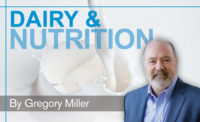Dairy consumption may promote heart health
Dairy foods, as part of overall healthy eating patterns, are linked to reduced risk of high blood pressure and cardiovascular disease among adults

Since National Dairy Council’s inception over a century ago, the body of research linking dairy foods with reduced risk of disease has continued to grow. Today, dairy foods, as part of overall healthy eating patterns, are linked to improved bone health, especially among children and adolescents, as well as reduced risk of cardiovascular disease (CVD), type 2 diabetes and high blood pressure among adults.
The 2018 IFIC Food and Health Survey identified cardiovascular health as one of three top-desired consumer benefits. According to the Centers for Disease Control and Prevention, about 75 million Americans have high blood pressure, which increases the chances of having a heart attack
or stroke.
A recent study (https://tinyurl.com/ybtt9u69) showed eating dairy foods, especially yogurt,
was linked to reduced risk of high blood pressure in healthy adults. In the study, data from more than 150,000 females in the Harvard School of Public Health Nurses’ Health Study (NHS) and Nurses’ Health Study II (NHS II), as well as from more than 30,000 males in Health Professionals Follow-up Study (HPFS), were analyzed. The results showed:
- Those in the NHS, NHS II and HPFS groups who ate at least three servings of dairy per day compared to less than one-half serving per day had a 13%, 25% and 7% lower risk of high blood pressure, respectively.
- Regular yogurt consumption (at least five servings per week versus less than one serving per month) was associated with a 19%, 17% and 6% lower risk of high blood pressure in the NHS, NHS II and HPFS, respectively.
- An 18% lower risk of high blood pressure was associated with each additional serving of yogurt eaten per day.
The results of a large prospective study (https://tinyurl.com/y8m28rh7) showed that higher yogurt consumption among adults with hypertension was associated with a lower risk of CVD, including heart attack. This study found that eating at least 2 cups of yogurt per week was associated with a 30% lower risk of heart attack in women and a 19% lower risk in men. Participants who ate 1 cup or more of yogurt per week also had an approximately 20% lower risk of coronary heart disease or stroke during the follow-up period.
In a 22-year prospective study on adults 65 and older (https://tinyurl.com/ybndz3xn), researchers found that blood markers related to eating whole and reduced-fat dairy foods such as milk, cheese and yogurt were not associated with risk of death or dying from CVD events and may even be linked to some health benefits. Additionally, higher blood levels of a certain fatty acid in dairy were associated with lower risk of CVD and stroke.
The Prospective Urban Rural Epidemiology study published in The Lancet (https://tinyurl.com/ya2gzzbw) found that eating dairy foods in a variety of fat levels is linked to reduced risk of major CVD events and mortality in adults from 21 countries. It involved more than 136,000 adults aged 35 to 70 across five continents who completed food-frequency questionnaires to record dairy consumption of milk, cheese and yogurt. This was further categorized into low-fat and whole-fat dairy.
The main findings showed:
- Higher consumption of total dairy (more than two servings per day compared to 0.5 servings) was associated with reduced risk of total mortality, noncardiovascular mortality, cardiovascular disease mortality, major cardiovascular disease and stroke.
- Higher milk and yogurt consumption (more than one serving per day compared to none) was associated with reduced risk of total mortality.
- Cheese and butter consumption (butter intake was low) was not associated with risk of total mortality.
All of these studies add to the greater body of science (https://tinyurl.com/yaksd46a) showing that in healthy adults, eating dairy foods can be part of a calorie-balanced, healthy eating plan.
Looking for a reprint of this article?
From high-res PDFs to custom plaques, order your copy today!





